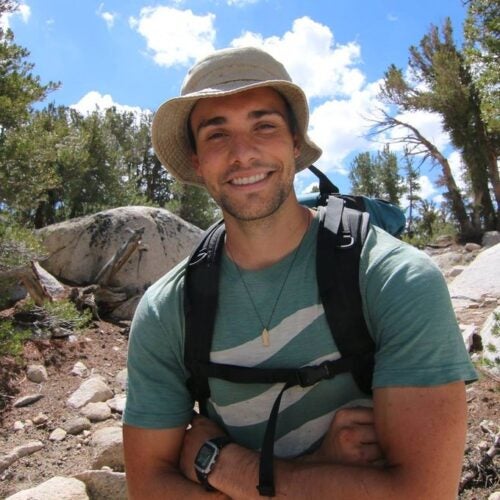Dr. Hayden Boettcher, Providence College
Hayden Boettcher recently started his new RI-INBRE Teaching Postdoctoral Fellow (TPF) at Providence College with Dr. Joseph DeGiorgis (Professor in the Biology Department at Providence College. Hayden graduated from the University of Wisconsin, Madison  in 2018 with undergraduate degrees in Zoology and Conservation Biology. As PhD student at the University of Delaware, he studied the impact of microplastic marine debris on larval blue crab survival and recruitment. Prior to being accepted in the fellowship program at PC, Hayden was accepted into the Delaware Environmental Institute (DENIN) Fellows Program at the University of Delaware. In Delaware, he spent the last five years researching microplastic pollution in the Delaware Bay and its impact on local wildlife.
in 2018 with undergraduate degrees in Zoology and Conservation Biology. As PhD student at the University of Delaware, he studied the impact of microplastic marine debris on larval blue crab survival and recruitment. Prior to being accepted in the fellowship program at PC, Hayden was accepted into the Delaware Environmental Institute (DENIN) Fellows Program at the University of Delaware. In Delaware, he spent the last five years researching microplastic pollution in the Delaware Bay and its impact on local wildlife.
In Delaware you were researching how microplastics affected Delaware’s blue crabs. What is your research focus at PC?
“Here at PC, our lab will be working on two projects simultaneously. The first involves understanding the mechanism responsible for “squid sunglasses”. To provide some context – when you and I need to adjust the amount of light coming into our eyes, our pupils adjust in size to allow more or less light onto our retina. This is why our pupils are so large in the dark (to let more light in). Squid eyes work in a different way. Instead of adjusting the size of the pupil, they have pigment granules (microscopic sun shades) that move up and down on tracks within the eye in response to light. In our lab we use biochemistry and microscopy to understand what motor proteins are responsible for moving these pigment granules up and down. The second project is focused on investigating the location and role of a protein called the “amyloid precursor protein” within the brain of squid and spinal cord of goldfish. The human form of this protein is the primary causative agent of Alzheimer’s disease in humans. By investigating the protein in squid and goldfish we hope to better understand its role and distribution in humans.”
What drew you to apply to the Postdoctoral Teaching & Research Fellow program at Providence College?
“Ultimately, my goal is to work as a professor at a primarily undergraduate institution (such as PC). Therefore, I wanted to pursue an opportunity where I could grow both as a researcher and an educator. The INBRE Postdoctoral Teaching & Research Fellowship at PC provided exactly what I was looking for. When researching potential landing spots, PC’s commitment to a well-rounded liberal arts education, small class sizes, and research excellence really stood out.”
Could you please tell us how you learned of the Postdoctoral Teaching & Research Fellow with Dr. DeGiorgis?
“I simultaneously reached out to many professors from multiple institutions regarding the fellowship. Often times professors are not in the position to take on a postdoctoral fellow, so it’s best to cast a wide net. I found this opportunity by specifically searching for teaching-focused postdoctoral fellowships. They are few and far between, and I was incredibly excited to have found it.”
